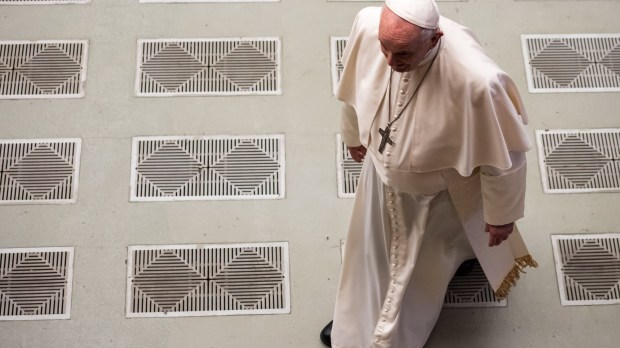Listening and understanding between Catholics and Orthodox for the enrichment of the universal Church: this is the credo of Theodore Kontidis, Latin Archbishop of Athens, himself born of parents of both confessions.
The archbishop explains why there will be no joint ecumenical celebration in Greece—unlike in Cyprus—during Pope Francis’ trip in the region.
Appointed last July, the Jesuit archbishop also talks about the Catholic minority in Greece (less than 1%) that the Pope will meet.
What is the reality of the Archdiocese of Athens that the Pope will visit?
In Athens, there’s a particular situation, because our diocese includes a whole diaspora: the 12 parishes are very large, and they aren’t neighborhood parishes; some are almost 100 miles from the capital. The families are very scattered amidst an Orthodox environment. The clergy is composed of 40 priests, including religious. We also have religious communities, Catholic institutes, which have a long history here.
In Greece, the Catholic presence is concentrated in certain regions: in the islands, in Athens, in Salonica. Some regions were without Catholics before the arrival of migrants in recent years.
The Catholics of Greece come from various origins and cultures. Do they mix with each other?
Catholics of Greek origin are indeed a minority among Filipino, Polish, Albanian, and Nigerian Catholics… We also have communities of Byzantine and Armenian rites. It’s a challenge to find unity in this multicolored context. Beyond the difficulty, I see it as an opportunity to understand that what unites us is faith. The essential thing is faith in Jesus, which is the basis of our unity, of our brotherhood.
How do Catholics feel in anticipation of the Pope’s visit?
They await him with joy. His presence among us is a celebration. It’s an extraordinary event in a country where almost the entire population is Orthodox. I hope that the Pope’s visit will be a call to faith for those who are close to the Church, but also a call for those who have drifted away, and a call for unity among Catholics.
This trip is also a door that opens onto the Christian world. Perhaps we do not know each other well enough between Catholics and Orthodox, and we can discover that we have the same faith, the same tradition.
How are the relations with the Orthodox?
History has created a divergence, sometimes a hostility between Catholics and Orthodox. Some remain in this heritage and are very negative; they do not want to see in the other a brother in the faith, they speak of a heretical Church, or of schismatics, and they think it’s better not to have mutual contact. The rigid and closed attitude towards the other is present in all churches, but it is stronger in today’s Orthodoxy than in Catholicism after Vatican II. As a son born into a mixed family, I know that there is richness on both sides, and sharing it will do the universal Church a lot of good.
What can the two churches bring to each other?
For us, it is enriching to see how the Orthodox live their faith, how they celebrate their sacraments, and how they care for their neighbor. At the level of the structure of their Church, they speak a lot about synodality. That is why they do not want to have a pope. They think that this takes away the freedom of the local churches or diminishes it. People in Orthodox countries also seem to resist secularization better; they are more attached to tradition from one generation to another.
On the other hand, Catholics are more willing to continue to reform when the social or historical situation demands it. It may be interesting for the Orthodox to see how the Catholic Church carries out its reforms. If we understand each other better, it helps us to understand better what is essential in our faith, and to distinguish the essential from the non-essential.
There is a meeting with the Orthodox Archbishop of Athens Hieronymus II. But why is there no joint celebration during this trip?
The Orthodox do not want it. This is the line they have adopted in Greece. For them, prayer, the Eucharistic celebration, means full unity. Since there isn’t agreement on all points, they feel that one cannot pretend that the differences do not exist. They do not want to participate in common prayers. However, there will be Orthodox representatives at the Mass celebrated by the Pope on December 5. They can attend but not participate in a common celebration.
Can this trip make a difference in that regard?
This trip is a step towards rapprochement. The Pope expresses his closeness and his esteem. He has an attitude of interest in others, to meet them, to know them, to listen to them.
Is the health situation, with the resurgence of Covid-19, complicating the organization of the trip?
Some people are afraid, but everything will be under strict control. There are more security measures: everything is conditioned to the possession of a health pass.
Interview by Anna Kurian

